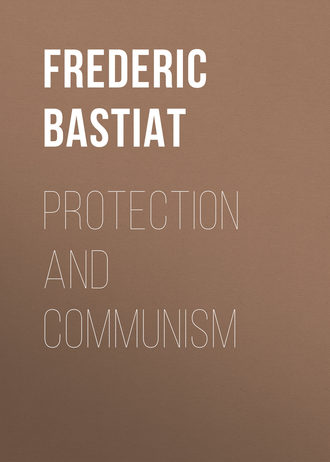 полная версия
полная версияProtection and Communism
Assuredly, if to unmask Protectionism is to aim a blow at Communism in consequence of their close connexion, one might also destroy both, by adopting a course the converse of the above. Protection would not stand for any length of time before a good definition of the right of property. Also, if anything has surprised and rejoiced me, it is to see the Association for the Defence of Monopolies devote their resources to the propagation of your book. It is an encouraging sight, and consoles me for the inutility of my past efforts. This resolution of the Mimerel Committee will doubtless oblige you to add to the editions of your work. In this case, permit me to observe to you that, such as it is, it presents a grave deficiency. In the name of science, in the name of truth, in the name of the public good, I adjure you to supply it; and I warn you that the time has come when you must answer these two questions:
First, Is there an incompatibility in principle between the system of Protection and the right of property?
Secondly, Is it the function of the government to guarantee to each the free exercise of his faculties, and the free disposal of the fruits of his labour – that is to say, property – or to take from one to give to the other, so as to weigh in the balance profits, contingencies, and other circumstances?
Ah! Sir, if you arrive at the same conclusions as myself – if, thanks to your talents, to your fame, to your influence, you can imbue the public mind with these conclusions, who can calculate the extent of the service which you will render to French society? We would see the state confine itself within its proper limits, which is, to secure to each the exercise of his faculties, and the free disposition of his possessions. We would see it free itself at once, both from its present vast but unlawful functions, and from the frightful responsibility which attaches to them. It would confine itself to restraining the abuses of liberty, which is to realize liberty itself! It would secure justice to all, and would no longer promise prosperity to any one. Men would learn to distinguish between what is reasonable, and what is puerile to ask from the government. They would no longer overwhelm it with claims and complaints; no longer lay their misfortunes at its door, or make it responsible for their chimerical hopes; and, in this keen pursuit of a prosperity, of which it is not the dispenser, they would no longer be seen, at each disappointment, to accuse the legislature and the law, to change their rulers and the forms of government, heaping institution upon institution, and ruin upon ruin. They would witness the extinction of that universal fever for mutual robbery, by the costly and perilous intervention of the state. The government, limited in its aim and responsibility, simple in its action, economical, not imposing on the governed the expense of their own chains, and sustained by sound public opinion, would have a solidity which, in our country, has never been its portion; and we would at last have solved this great problem —To close for ever the gulf of revolution.
THE END1
An association, Mr. Porter informs us, composed like that assembling (or that did assemble, for we are not quite sure whether it still exists,) at No. 17, New Bond Street, exclusively of producers, at least of the article sought to be protected, and therefore of persons who believe themselves to be interested in excluding from the home market the productions of others.
2
The truth of this is found on all occasions where the interests or the passions of men are concerned, and was rather amusingly shown in many ways when the free-trade measures of Sir R. Peel were being carried through. Then every interest desired free-trade, except with reference to the articles produced by itself.
3
As Mr. Porter says, in one of his excellent notes on M. Bastiat's work on Popular Fallacies, 'The true history of all progress in regard to great questions, involving change in social policy, is here indicated by M. Bastiat. It is in vain that we look for such change through the enlightenment of what should be the governing bodies. In this respect, all legislative assemblies, whether called a Chamber of Deputies or a House of Commons, are truly representatives of the public mind, never placing themselves in advance, nor lagging much behind the general conviction. This is not, indeed, a new discovery, but we are much indebted to Mr. Cobden and the leading members of the Anti-Corn-Law League for having placed it in a point of view so prominent that it can no longer be mistaken. Hereafter, the course of action is perfectly clear upon all questions that require legislative sanction. This can only be obtained through the enlightenment of the constituency; but when such enlightenment has been accomplished – when those mainly interested in bringing about the change have once formed their opinion in its favour, the task is achieved.'
4
This, as most of our readers are aware, is an imaginary country at the other side of the world, where a state of circumstances is supposed to exist productive of general happiness – moral and physical – to all. The chief creator of this modern Utopia, from which indeed the idea is confessedly taken, is M. Cabet, whose book was published during the year of the late revolution in France. It is meant to be a grave essay on possible things, but could only be considered so, we venture to think, in Paris, and only there in times of unusual excitement. The means by which M. Cabet and his followers suppose their peculiar society could be established and maintained, are beyond conception false, ludicrous, and puerile. M. Cabet was obliged to leave France for a grave offence, but found a refuge and no inconsiderable number of followers in America, where, by the side of much that is excellent and hopeful, flourishes, perhaps, under present circumstances, as a necessary parallel, many of the wild and exploded theories of the world.
5
By this phrase we believe is meant much more than the English words might indicate – the supplying all the capital necessary to start the artisan in the world.
6
We think, with Adam Smith and most others, that education and religious instruction may fairly and properly, if the occasion requires, be excepted from this rule, on the ground that as they are most beneficial to the whole of society – their effects not stopping short with the persons receiving the immediate benefits – 'they may, without injustice, be defrayed by the general contribution of the whole society.' We by no means say, however, that this public support should supersede voluntary contribution.
7
This is a happy exposure of the inconsistency of M. Thiers. But we have had recently, and in the sitting of the late National Assembly, a curious example of the perversion of his extraordinary powers, in the speeches, full of false brilliancy, to the legislature of France, in condemnation of the principles of Free-trade. His statements were coloured, or altogether without foundation; the examples which he adduced, when looked into, told against him, and his logic was puerile. Yet he found an attentive and a willing auditory. Indeed, the prejudices of the French on this subject, mixed up as they are with so many influences operating on their vanity, are still inveterate; and it was, as it always has been, M. Thiers's object to reflect faithfully the national mind. His aim never was the noble one of raising and enlightening the views of his countrymen, but simply to gain an influence over their minds, by encouraging and echoing their prejudices and keeping alive their passions.
8
It is not easy here, and in some other places, to convey the exact meaning without using circuitous language.
9
What M. Bastiat here asserts is unquestionably true. For it has often been shown, and may readily be shown, that the importation of foreign commodities, in the common course of traffic, never takes place except when it is, economically speaking, a national good, by causing the same amount of commodities to be obtained at a smaller cost of labour and capital to the country. To prohibit, therefore, this importation, or impose duties which prevent it, is to render the labour and capital of the country less efficient in production than they would otherwise be; and compel a waste of the difference between the labour and capital necessary for the home production of the commodity, and that which is required for producing the things with which it can be purchased from abroad. The amount of national loss thus occasioned is measured by the excess of the price at which the commodity is produced over that at which it could be imported. In the case of manufactured goods, the whole difference between the two prices is absorbed in indemnifying the producers for waste of labour, or of the capital which supports that labour. Those who are supposed to be benefited – namely, the makers of the protected article, (unless they form an exclusive company, and have a monopoly against their own countrymen, as well as against foreigners,) do not obtain higher profits than other people. All is sheer loss to the country as well as to the consumer. When the protected article is a product of agriculture – the waste of labour not being incurred on the whole produce, but only on what may be called the last instalment of it – the extra price is only in part an indemnity for waste, the remainder being a tax paid to the landlords. – J. S. Mill
10
The ease with which the body of the people – the consumers – are deceived by statements and arguments such as are given in the text is remarkable. The principal reason, perhaps, is, that men are disposed at first to regard themselves as producers rather than as consumers. They imagine that the advantages of Protection, if applied to their own case, would be incontestable; and, being unable consistently to deny that their neighbours are equally entitled to the same favour, a general clamour for Protection against foreign competition arises. While they fail to perceive the absurdity of universal Protection and its fallacy, or that it would be more for their interests to be able to dispose of a larger quantity of their productions, though perhaps at a reduced cost, than a smaller quantity in a market narrowed, as it must be, by the Protection which it receives.
11
This is a well-earned tribute, both to the people of England, and to the results of the exertions of the League and of Sir R. Peel. There can be no doubt that the calmness of this country, during the late agitations of Europe, was very much due to the contentment which followed on the abolition of the corn-laws, and on the reduction and simplification of the tariff. To this must be added the conviction (though the process is sometimes sufficiently slow), that their wishes, when clearly indicated, find expression and attention in the legislature, and that things are working on to a great though gradual improvement. The inhabitants of this kingdom had the practical good sense to perceive the progress made, and the security they had that the future would not be barren, and they refused to imperil these substantial advantages in favour of mere theories and of experiments, the effects of which no human wit could foresee.






